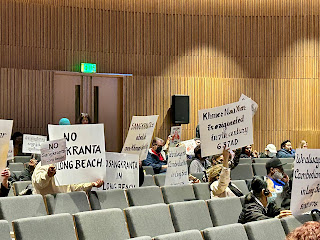April 17, 1975 is a day of remembrance of the suffering of all Cambodian people who lost their families, relatives, friends and compatriots during the Pol Pot’s brutal regime. Monks conduct Bangsokol and survivors pay tribute to them at pagoda Pudtamonkol. With the severity of the crimes – the crimes of all crimes – many victims will never forget and will never forgive the Khmer Rouge murderers. Cambodia shouldn’t “bury the past” and those perpetrators should be held accountable for their crimes.
Forty-eight years later, as I look back, I realize that time does not wait for anyone. I often ask myself what is my definition of living (a meaningful life)? Is living my day-to-day experience fit my definition of living? With the education, knowledge, and training I have, I can't close my eye and pretend I am blind; I can't close my mouth and pretend I am dumb; I can’t close my ear and pretend I am deaf against so much injustice, cruelty, and insatiable greed of political leaders.
Let me share what really trouble me: “My mother along with two brothers and two sisters are dead while many of the Khmer Rouge cadres who ordered and engaged in stabbing children, killing and beating people to death, starving them, and denying them medical help, are living freely under the pseudonym of peace and reconciliation”. Is Karma erroneous? How could this callousness, brutality, cruelty, inhumanity and injustice occur? What happened to the rule of law? What happened to the Extraordinary Chambers in the Courts of Cambodia (ECCC) known as the Khmer Rouge Tribunal? Afterspending US$337 million, 16 years and mired in claims of political interference, only three Khmer Rouge leaders had been sentenced. To date, only Khieu Samphan, 92, Chief of State, is serving life sentence brings to account for all the suffering the Khmer Rouge caused, while convicted Khmer Rouge’s No. 2 leader and chief ideologist Nuon Chea died in 2019 at the age of 93, and convicted Prison chief Kaing Guek Eav, known as Duch, died in 2020 at age 77 while serving a life sentence.
I realize there simply is no adequate answer. These questions call for a response. My definition of living is to find justice and uncover the truth for the death of my mother, two brothers, and two sisters (even if I have to do this alone). Without justice and truth, there can be no real reconciliation and genuine peace.






